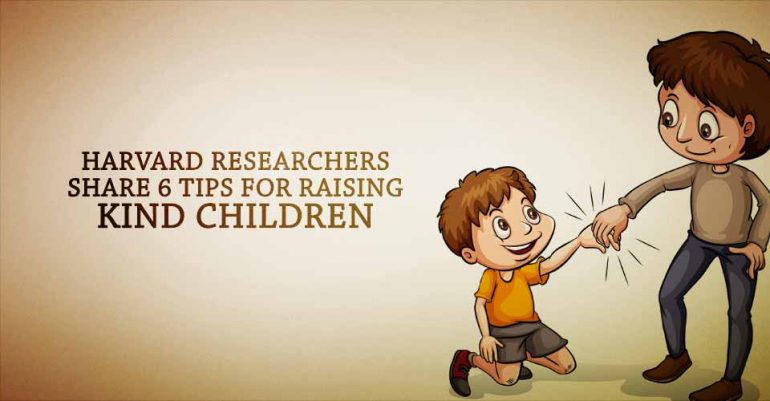“Perhaps it takes courage to raise children,” mused John Steinbeck. Parenting is a profoundly brave thing to do. It is also one of the most valuable and rewarding. Harvard psychologists have compiled an in-depth study of strategies we can use to raise children who are truly good people.
HERE ARE SIX YOU CAN PUT INTO USE TODAY:
1. TEACH YOUR CHILDREN WHAT TO DO WITH THEIR EMOTIONS.
Feelings like anger, sadness, and frustration can be overwhelming to a child. Honestly, they confuse many adults! Help your children to identify difficult emotions. Explain how to be compassionate when they see these feelings manifest in others. Teach them healthy strategies to manage stress, pain, and disappointment. Set firm boundaries when it comes to dealing with emotions in a destructive way. Teach your children how to calm themselves. Practice healthy and productive methods of conflict resolution. Then, send them out into the world with these rare and valuable skills.
2. TALK ABOUT ETHICS, RESPONSIBILITY, AND YOUR CHILD’S ROLE IN THEIR COMMUNITY.
Most children are very interested in moral questions. We can use this to mold them into people who make a positive difference in our world. Discuss ethical dilemmas on TV and in the news. Ask your child what kind of world they would like to live in, and what they can do to work towards that. Encourage them to volunteer, stand up for others, and keep their environment safe and clean. Set a good example by doing the same. Find a place to volunteer together and make wonderful memories while giving back to the community.
3. EXPAND YOUR CHILD’S WORLD.
Children naturally develop empathy for their friends and family members. Widen their circle of concern to include others. Ask them to consider how it would feel being the new kid in class. What would it be like to move to a new town? Talk about the difference it might make to invite the new child in class over to play. Discuss problems on a larger scale, as well. What can we do for children who do not have enough food to eat? Can we help people who do not have a home? Build your child’s sense of social responsibility. Give them age-appropriate ways to take action.
4. PRACTICE GRATITUDE AT HOME.
Even young children can keep a gratitude list. They don’t have to be written. You can make a family habit of going around the dinner table each night saying something you are thankful for. Teach your child that, while recognizing our gratitude is a good start, showing it through our actions is even better. For example, if your son is thankful to have his grandmother in his life, he can show his appreciation by baking her cookies. Discuss ongoing demonstrations of gratitude, as well. Explain that we do our chores to show that we are thankful for our home and family.
5. SET – AND MAINTAIN – ETHICAL STANDARDS.
Most parents are very clear when it comes to academic expectations. Why not do the same with ethical behavior? Be clear about your family values, and check in often to ensure your child’s words and actions reflect them. Do they behave respectfully? Do they keep their promises? Do they treat their peers with kindness and compassion? Do they stand up for people who are being treated unfairly? Ask your child’s teachers and coaches about these things. Give ethical issues as much focus as you would academic and athletic performance. Be a role model by holding yourself to the same ethical standards.
6. SPEND TIME GETTING TO KNOW YOUR CHILDREN.
If all of your interaction with your child is discipline-based, you will not be a very effective teacher. Make an effort to build a relationship with your child. Ask open ended questions about their interests and friends. Have at least one real conversation each day. Once a week, go out and do something fun together. Engage in their interests. Spend an afternoon painting with your young artist. Play catch with your budding athlete. Children who have strong relationships with their parents are more confident and kind. They know who they are. They learn to love themselves, and they are able to give that love away to others.
“Parents can only give good advice or put them on the right paths, but the final forming of a person’s character lies in their own hands,” wrote Anne Frank. Raising a kind child is one of the most wonderful things you can do for the world. Do your best to model kindness and give your child every opportunity to learn compassion. The rest is in their hands.
Credits: Unified Soul Theory.









